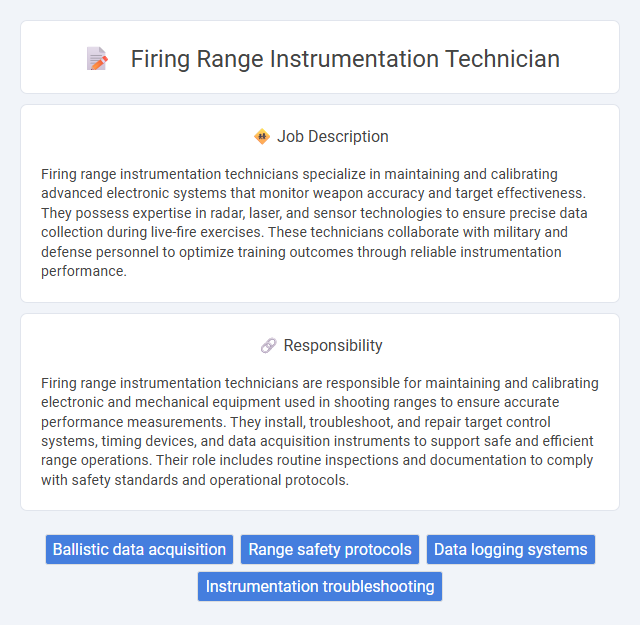
Firing range instrumentation technicians specialize in maintaining and calibrating advanced electronic systems that monitor weapon accuracy and target effectiveness. They possess expertise in radar, laser, and sensor technologies to ensure precise data collection during live-fire exercises. These technicians collaborate with military and defense personnel to optimize training outcomes through reliable instrumentation performance.
Individuals with strong attention to detail and technical aptitude will likely excel as firing range instrumentation technicians, given the job's demand for precise calibration and maintenance of specialized equipment. Those comfortable working in controlled, often noisy environments and able to follow strict safety protocols might find this role suitable. Candidates with limited mechanical skills or discomfort around firearms may face challenges in adapting to the requirements of this position.
Qualification
Firing range instrumentation technicians must possess a strong background in electronics, mechanical systems, and computer programming, often requiring an associate degree or specialized technical training. Proficiency in troubleshooting and maintaining sophisticated firing range systems, including sensor arrays and data recording devices, is essential for ensuring operational accuracy and safety. Certifications in electronics or instrumentation technology enhance job prospects and demonstrate expertise in handling advanced firing range equipment.
Responsibility
Firing range instrumentation technicians are responsible for maintaining and calibrating electronic and mechanical equipment used in shooting ranges to ensure accurate performance measurements. They install, troubleshoot, and repair target control systems, timing devices, and data acquisition instruments to support safe and efficient range operations. Their role includes routine inspections and documentation to comply with safety standards and operational protocols.
Benefit
The role of a firing range instrumentation technician likely offers significant benefits such as hands-on experience with advanced military equipment and technology. Opportunities for specialized training and skill development could enhance career prospects within defense sectors. Competitive compensation and job stability may also be probable perks due to the technical nature and demand for this expertise.
Challenge
Firing range instrumentation technician roles likely present challenges related to maintaining precision equipment under demanding conditions, requiring strong technical expertise and problem-solving skills. These technicians probably encounter frequent troubleshooting scenarios due to the complexity of instrumentation systems and the critical nature of accurate data collection. Adapting to evolving technologies and ensuring safety compliance may also pose ongoing obstacles that demand continuous learning and vigilance.
Career Advancement
Firing range instrumentation technicians gain expertise in maintaining and calibrating advanced electronic systems critical for safety and accuracy at shooting ranges. Career advancement opportunities include progressing to senior technician roles, specializing in defense or military-grade instrumentation, and transitioning into management or training positions within security or defense sectors. Continuous skill development in electronics, data analysis, and safety protocols enhances job prospects and leadership potential in this technical field.
Key Terms
Ballistic data acquisition
A Firing Range Instrumentation Technician specializes in ballistic data acquisition by operating and maintaining advanced electronic and optical systems to capture precise projectile trajectory and performance metrics. Utilizing radar, high-speed cameras, and sensors, they ensure accurate measurement of velocity, impact points, and environmental conditions critical for weapons testing and evaluation. Their expertise supports real-time data logging and analysis, enhancing the reliability and safety of firing range operations.
Range safety protocols
Firing range instrumentation technicians specialize in maintaining and calibrating electronic systems that monitor firearm discharge and target impact accuracy. They strictly adhere to comprehensive range safety protocols, including verifying all safety equipment functionality and enforcing proper firearm handling procedures to prevent accidents. Expertise in real-time data analysis ensures immediate identification of any safety breaches, minimizing risk to personnel and equipment during live-fire exercises.
Data logging systems
Firing range instrumentation technicians specialize in maintaining and calibrating data logging systems that record projectile velocity, trajectory, and impact data in real time. Their expertise ensures accurate capture and analysis of ballistic performance metrics essential for weapons testing and training evaluations. Proficiency in software integration and hardware troubleshooting is crucial for reliable operation of digital data acquisition and sensor networks within firing ranges.
Instrumentation troubleshooting
Firing range instrumentation technicians specialize in troubleshooting complex electronic systems that monitor and record live-fire exercises. Their expertise includes diagnosing sensor malfunctions, calibrating measurement devices, and repairing data acquisition hardware to ensure accurate performance metrics. Proficiency in signal processing and electronic circuit analysis is critical for maintaining reliable firing range instrumentation.
 kuljobs.com
kuljobs.com